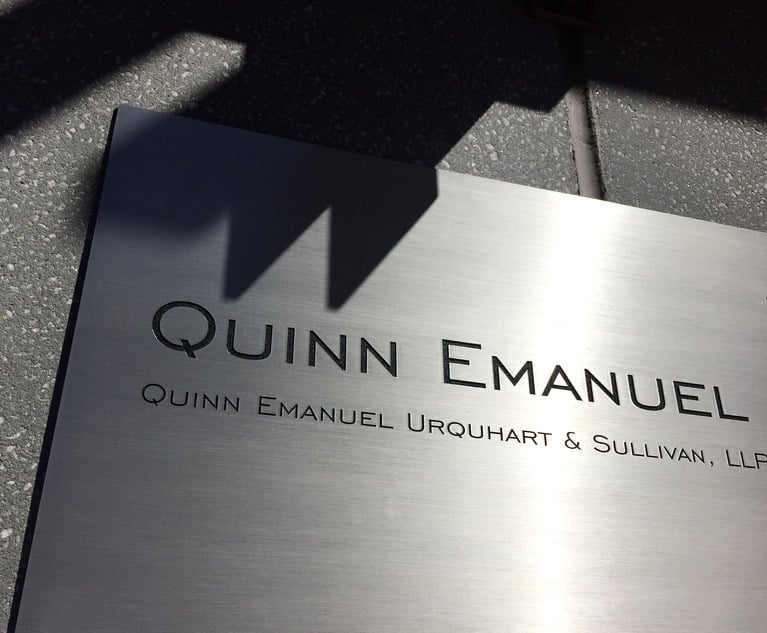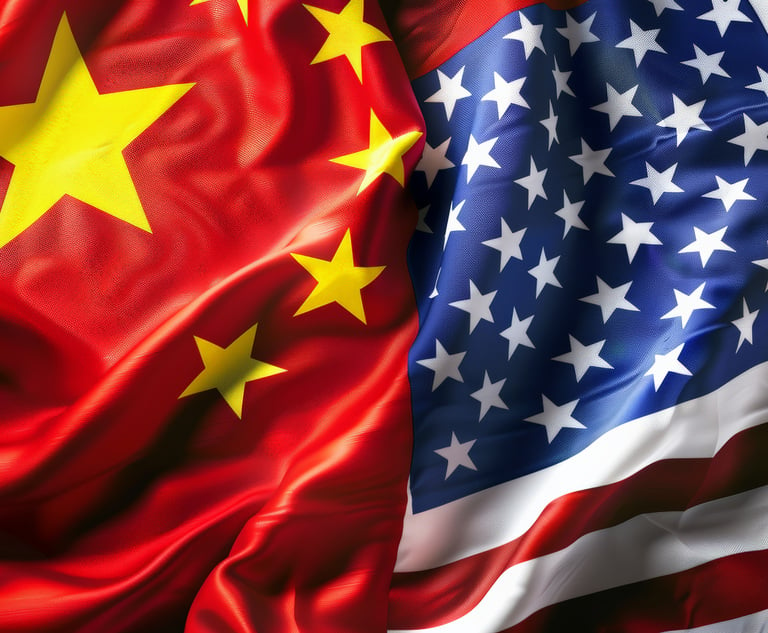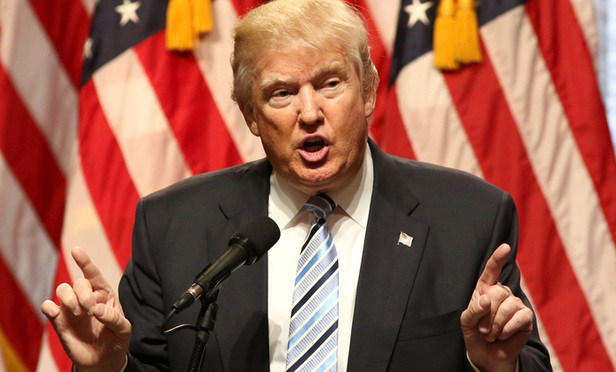'Trump can't un-know he owns Trump Tower' - Morgan Lewis to advise president-elect on plan to avoid business conflicts
Morgan Lewis & Bockius partner Sheri Dillon appears with Trump at news conference
January 12, 2017 at 06:01 AM
3 minute read
During a raucous news conference that was unusually heavy with tax law theory, Donald Trump and Morgan Lewis & Bockius partner Sheri Dillon outlined how the president-elect plans to distance himself from his companies.
The US law firm will help Trump move his business assets to a trust, shift company leadership to his two adult sons and a third corporate executive, and add both a management-level ethics adviser and a chief compliance officer to the company.
Dillon also said that Trump's companies, known collectively as the Trump Organization, would make no new foreign deals during his time in office.
"He directed me and my colleagues at Morgan Lewis to design a structure for his business empire that would completely isolate him from the management of the company," Dillon said. "He instructed us to take all steps realistically possible to make it clear that he is not exploiting the office of the presidency for his personal benefit."
Dillon provided reasons why Trump would not divest from his companies, as many critics have suggested he must. A sale even to Trump's children could create further financial and ethical complications, because his children would need to find lenders for the purchase, she said. A sale of the Trump brand to a third party would mean the president would continue to earn royalties.
"President Trump can't un-know he owns Trump Tower," she said.
The Morgan Lewis tax lawyer further highlighted the firm's work for Trump. She introduced Fred Fielding, a former White House counsel and Wiley Rein name partner-turned Morgan Lewis lawyer, as a key part of the legal team.
Aside from Fielding, Morgan Lewis's tax department is well known because of its acquisition of Bingham McCutchen lawyers in 2014, including many who had come from tax boutique McKee Nelson five years earlier. The firm has handled tax work for Trump and the Trump Organization since 2005.
After the Bingham acquisition, Morgan Lewis became the fourth-largest law firm in Washington DC.
Dillon compared Trump's business interests to those of magnate Nelson Rockefeller, the vice-president under President Gerald Ford. "But at that time, no one was so concerned," she said.
Dillon also spoke about the conflicts of interest statute and the emoluments clause of the Constitution, which prohibits federal officials from accepting gifts. Regarding conflicts, Trump's decision to distance himself is voluntary and not required by Congress, she said. And, she added, "Trump will donate all profits from foreign government payments made to his hotels to the United States Treasury."
During the conference, Trump also noted that he would make a decision on a US Supreme Court nominee to fill the seat vacated by the late Justice Antonin Scalia within two weeks following his inauguration.
This content has been archived. It is available through our partners, LexisNexis® and Bloomberg Law.
To view this content, please continue to their sites.
Not a Lexis Subscriber?
Subscribe Now
Not a Bloomberg Law Subscriber?
Subscribe Now
NOT FOR REPRINT
© 2025 ALM Global, LLC, All Rights Reserved. Request academic re-use from www.copyright.com. All other uses, submit a request to [email protected]. For more information visit Asset & Logo Licensing.
You Might Like
View All
X Ordered to Release Data by German Court Amid Election Interference Concerns

Quinn Emanuel's Hamburg Managing Partner and Four-Lawyer Team Jump to Willkie Farr

Trump ICC Sanctions Condemned as ‘Brazen Attack’ on International Law

U.S.- China Trade War: Lawyers Label WTO Dispute Pointless, Clients Have Their Hands Tied
Trending Stories
- 1States Accuse Trump of Thwarting Court's Funding Restoration Order
- 2Microsoft Becomes Latest Tech Company to Face Claims of Stealing Marketing Commissions From Influencers
- 3Coral Gables Attorney Busted for Stalking Lawyer
- 4Trump's DOJ Delays Releasing Jan. 6 FBI Agents List Under Consent Order
- 5Securities Report Says That 2024 Settlements Passed a Total of $5.2B
Who Got The Work
J. Brugh Lower of Gibbons has entered an appearance for industrial equipment supplier Devco Corporation in a pending trademark infringement lawsuit. The suit, accusing the defendant of selling knock-off Graco products, was filed Dec. 18 in New Jersey District Court by Rivkin Radler on behalf of Graco Inc. and Graco Minnesota. The case, assigned to U.S. District Judge Zahid N. Quraishi, is 3:24-cv-11294, Graco Inc. et al v. Devco Corporation.
Who Got The Work
Rebecca Maller-Stein and Kent A. Yalowitz of Arnold & Porter Kaye Scholer have entered their appearances for Hanaco Venture Capital and its executives, Lior Prosor and David Frankel, in a pending securities lawsuit. The action, filed on Dec. 24 in New York Southern District Court by Zell, Aron & Co. on behalf of Goldeneye Advisors, accuses the defendants of negligently and fraudulently managing the plaintiff's $1 million investment. The case, assigned to U.S. District Judge Vernon S. Broderick, is 1:24-cv-09918, Goldeneye Advisors, LLC v. Hanaco Venture Capital, Ltd. et al.
Who Got The Work
Attorneys from A&O Shearman has stepped in as defense counsel for Toronto-Dominion Bank and other defendants in a pending securities class action. The suit, filed Dec. 11 in New York Southern District Court by Bleichmar Fonti & Auld, accuses the defendants of concealing the bank's 'pervasive' deficiencies in regards to its compliance with the Bank Secrecy Act and the quality of its anti-money laundering controls. The case, assigned to U.S. District Judge Arun Subramanian, is 1:24-cv-09445, Gonzalez v. The Toronto-Dominion Bank et al.
Who Got The Work
Crown Castle International, a Pennsylvania company providing shared communications infrastructure, has turned to Luke D. Wolf of Gordon Rees Scully Mansukhani to fend off a pending breach-of-contract lawsuit. The court action, filed Nov. 25 in Michigan Eastern District Court by Hooper Hathaway PC on behalf of The Town Residences LLC, accuses Crown Castle of failing to transfer approximately $30,000 in utility payments from T-Mobile in breach of a roof-top lease and assignment agreement. The case, assigned to U.S. District Judge Susan K. Declercq, is 2:24-cv-13131, The Town Residences LLC v. T-Mobile US, Inc. et al.
Who Got The Work
Wilfred P. Coronato and Daniel M. Schwartz of McCarter & English have stepped in as defense counsel to Electrolux Home Products Inc. in a pending product liability lawsuit. The court action, filed Nov. 26 in New York Eastern District Court by Poulos Lopiccolo PC and Nagel Rice LLP on behalf of David Stern, alleges that the defendant's refrigerators’ drawers and shelving repeatedly break and fall apart within months after purchase. The case, assigned to U.S. District Judge Joan M. Azrack, is 2:24-cv-08204, Stern v. Electrolux Home Products, Inc.
Featured Firms
Law Offices of Gary Martin Hays & Associates, P.C.
(470) 294-1674
Law Offices of Mark E. Salomone
(857) 444-6468
Smith & Hassler
(713) 739-1250









